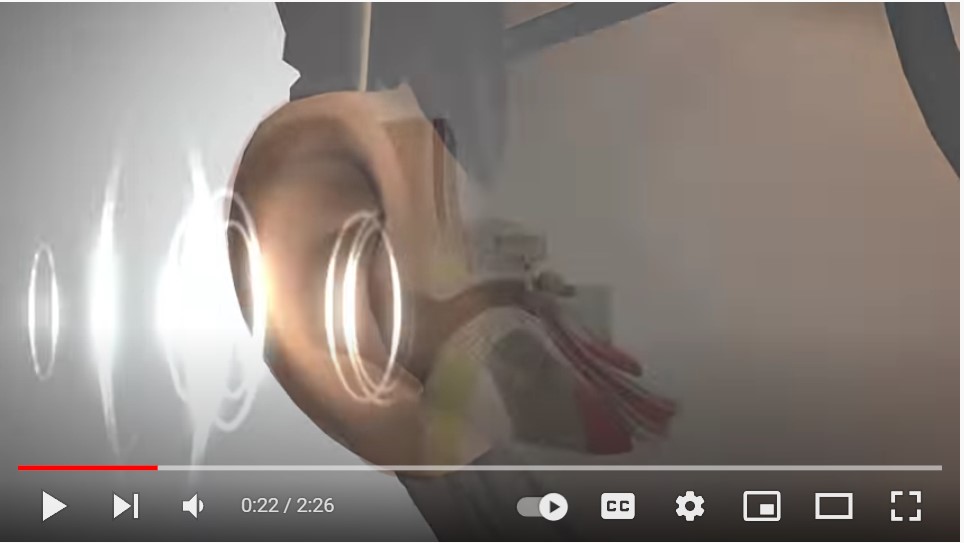Bubble-popping noises in-ears are a common complaint. It is often an indication of wax within the ear canal, which can be removed by using cotton buds (Q-tips) or flushing it out with water.
If there is no improvement after removing ear wax and/or water irrigation, I recommend seeing a doctor to check for other causes.
Severe Tinnitus can be related to Meniere’s disease, which is an inner ear disorder resulting in vertigo and hearing loss, among many other symptoms. A thorough medical workup may reveal a number of problems within the body that are causing these symptoms.
Some people have had success treating their tinnitus with hypnosis, and others have had success with a range of other treatments such as acupuncture or herbal remedies.
If your ear problem is related to an underlying health disorder, a doctor may prescribe some treatment for this. The most important is to see someone about it as soon as you can. You shouldn’t wait for it to drive you crazy!
What Causes Bubble Popping Noise In Ears?
Some of the reasons for the Bubble popping noise in ears are given below-
| No. | Causes | Description |
|---|---|---|
| 1 | Ear Wax | Excess ear wax can lead to popping or squealing noises; can be cleaned with cotton buds or syringes. |
| 2 | Tinnitus | Condition affecting ears/brain processing sound; caused by various factors, from ear wax to inner ear damage. |
| 3 | Infection | Eustachian tube infection can lead to popping noises, often accompanied by flu-like symptoms. |
| 4 | Barotrauma | Air pressure changes during flying can affect inner ear air pockets; may need help equalizing pressure. |
| 5 | Tumors | Rare; tumors in ear can cause popping noises; usually distinguishable from normal symptoms. |
| 6 | Meniere’s Disease | Inner ear condition causing ringing, popping, vertigo, and hearing loss. |
| 7 | Ear Drum Rupture | Infection or pressure exposure can rupture eardrum; surgery may be needed for repair. |
| 8 | Ear Wax Blockage | Excess ear wax buildup can push on eardrum, causing popping noises; removal needed. |
| 9 | Foreign Object | Debris stuck in ear can cause popping; medical attention may be required for removal. |
| 10 | Perforated Eardrum | High pressure or explosion can damage eardrum, causing popping, hearing loss, and dizziness. |
| 11 | TMJ Disorder | Jaw joint problem can cause popping noises in ears, ringing, and other symptoms. |
| 12 | Benign Fasciculation | Uncommon condition causing muscle twitching, including ear muscles, leading to popping noises. |
Diagnosing the Causes of Bubble Popping Noise in Your Ear
Experiencing a bubble-popping noise in your ear can be a strange and unsettling sensation. It’s important to understand that this peculiar sound can stem from various underlying factors.
1. Ear Wax Buildup: Imagine your ear canal as a tunnel that leads to your eardrum. Sometimes, this tunnel can get blocked by excess ear wax, kind of like a traffic jam. To diagnose if ear wax buildup might be causing the popping noise, consider whether you’ve been experiencing any changes in your hearing, a feeling of fullness in your ear, or even slight pain. If these symptoms sound familiar, it’s possible that the buildup of ear wax is to blame. You can try using a warm, damp cloth to gently clean the outer part of your ear. If that doesn’t help, it might be a good idea to consult a doctor.
2. Tinnitus: Think of tinnitus as a miscommunication between your ears and your brain. It’s like hearing a song that isn’t actually playing. If you’ve been hearing the popping noise along with other strange sounds, like ringing or buzzing, you might have tinnitus. To diagnose this, try listening in a quiet room. If you still hear the popping noise when there’s no other external noise, it could be tinnitus. Reach out to a healthcare professional if this persists.
3. Infection: Picture your ears as a guard at the entrance of a castle. Sometimes, harmful germs can sneak past the guard and cause trouble inside. If you’ve been feeling under the weather, with a scratchy throat or flu-like symptoms, and you’ve been hearing the popping noise, it might be due to an infection. To diagnose this, pay attention to whether the popping noise happens frequently and if it’s accompanied by other symptoms. If it seems like there’s an infection, it’s best to seek medical advice.
4. Barotrauma: Imagine your ear as a balloon that can change its size depending on the altitude. When you fly in an airplane or dive underwater, the pressure around you changes. If your ears can’t adjust properly, it’s like the balloon getting squished or inflated. If you’ve been on a plane recently and noticed the popping noise during takeoff or landing, it’s likely due to barotrauma. To diagnose this, try swallowing or yawning when you feel the popping. If it helps relieve the sensation, barotrauma might be the culprit.
5. Tumors: Think of your ear as a tiny theater stage where sounds are performed. Sometimes, an unwanted guest, like a tumor, can cause unexpected sounds. However, this is quite rare. To diagnose this, pay attention to the nature of the popping noise. If it seems more like a performance gone awry rather than a simple pop, it’s essential to consult a medical professional.
6. Meniere’s Disease: Imagine your inner ear as a delicate balance scale. When something disrupts this balance, you might hear strange noises. If you’ve been experiencing not only popping noises but also dizziness, ringing, and difficulty hearing, Meniere’s Disease could be the cause. To diagnose this, keep track of when these symptoms occur and whether they come and go. If there’s a pattern, it’s time to discuss this with a healthcare provider.
7. Ear Drum Rupture: Picture your eardrum as a thin layer protecting your inner ear. Sometimes, it can get damaged due to infections or pressure changes. If you’ve recently had an infection or been exposed to loud noises, and you’ve noticed a sudden popping noise, your eardrum might be ruptured. To diagnose this, think back to any recent events that might have put your ears at risk. If you suspect a ruptured eardrum, seek medical attention promptly.
8. Ear Wax Blockage: Imagine your ear canal as a tunnel that leads to your eardrum (again!). If there’s too much ear wax, it can cause a blockage and affect your hearing. To diagnose this, consider whether you’ve been cleaning your ears often and if you’ve noticed changes in your hearing. If it seems like excess ear wax might be causing the issue, consult a healthcare professional for safe removal.
9. Foreign Object: Think of your ear as a room with sensitive equipment. Sometimes, a tiny object can accidentally find its way in and cause disruptions. If you’ve been poking around in your ears or working in a dusty environment, a foreign object might be the cause. To diagnose this, think back to any recent activities that might have introduced foreign debris into your ear. If you suspect this is the case, it’s best to let a doctor handle the situation.
10. Perforated Eardrum: Picture your eardrum as a thin layer of paper. Exposure to extremely loud noises or sudden pressure changes can tear this delicate layer. If you’ve been in a situation with loud noises or sudden pressure shifts, and you’re experiencing popping noises along with hearing loss or dizziness, a perforated eardrum could be the reason. To diagnose this, reflect on recent events that might have caused such damage. Consult a healthcare professional to assess the extent of the issue.
11. TMJ Disorder: Imagine your jaw joint as a hinge that lets you open and close your mouth. If this hinge isn’t working properly, it can affect your ears too. If you’ve been having jaw pain, difficulty chewing, or noticed a clicking sound when you move your jaw, it could be a TMJ disorder. To diagnose this, pay attention to your jaw’s movements and any discomfort you might be experiencing. Consulting a doctor or dentist can help confirm if TMJ disorder is causing the popping noise.
12. Benign Fasciculation: Think of your muscles as actors on a stage. Sometimes, they twitch and move without your control. If you’ve noticed random muscle twitches, including those around your ear, and they coincide with the popping noise, it might be a benign fasciculation. To diagnose this, observe whether these twitches are occurring in other parts of your body. Consulting a healthcare professional can help determine if this condition is the cause.
In conclusion, deciphering the cause of a bubble popping noise in your ear involves careful consideration of the accompanying symptoms and recent activities. While some causes might be temporary and harmless, others could signal more serious underlying issues. If you’re unsure about the cause or if the popping noise persists, seeking medical advice is the best course of action. Remember, your ears play a vital role in your overall well-being, so it’s essential to take care of them and prioritize their health.
Bubble Popping Noise In Ears Treatment
Some treatments for the Bubble popping noises in-ears are Glycerin drops, over-the-counter earwax removal kits, and hot compresses.
- Glycerin drops: Glycerin is a lubricant, and it is used for patients who have dry ears. It also loosens the earwax so that it can be washed away more easily. Apply a few drops of glycerin into the affected ear canal, try to lie on your side, and let it run out through the other ear. Do not blow or try to force the earwax out. After a few days, the earwax will soften, and it can be washed away. (Ref.)
- Over-the-counter ear wax removal kit: some solutions can be used to soften ear wax, making it easier to remove. There are several different brands available OTC, usually in health and beauty supply stores. These kits work by applying a solution to the outside of the ear canal that contains a small amount of alcohol. The alcohol helps loosen up any hardened wax inside your ear canals so that it can be dissolved away.
- Hot Compress: If your ears are blocked due to colds or flu, try hot compresses to unblock them. Place a damp flannel in a bowl of boiling water for a few minutes and lie with the affected ear on the bowl about half an hour before bedtime so that the steam can clear the ear. Alternatively, add two or three drops of essential oil to the bowl and inhale the vapors when you drape a towel over your head as you lean over it. (eucalyptus, thyme, lavender, and peppermint oils are good choices)
- Ear candles: Although no scientific studies have been performed to prove that ear candling is effective, people have been using this ancient technique for many years with success.
How To Do Ear Candles?

Ear candles are sold in health food stores and some pharmacies.
To use ear candling, you start from the outer ear and move inward toward the eardrum.
A slow, steady pull is used while keeping your head tilted so that the wax moves down into your ear.
What happens during Ear Candling?
Scientific studies have found that ear candles cause a small flame to burn inside the candle. The flame is caused by oxygen traveling through the melted beeswax and wick in the base of the candle.
How Does Ear Candling Work?
Ear candles are often sold as an alternative remedy for sinus problems, hearing loss, and other health issues. The idea is that the ear candle will draw out impurities from your ears.
The idea is based on the ancient concept of Reiki, a Japanese technique that uses energy to promote healing. Some people believe that the same principle can be used by ear candling to improve health.
The theory behind ear candles is that the flame inside the candle will create a vacuum effect as it burns.
When air tries to rush into the hole, pressure builds against your tympanic membrane, also known as your eardrum. The pressure pushes out wax and other gunk from your ears.
What Are The Risks of Ear Candling
The flames could cause injury or burns if they come in contact with skin or clothing. If you have a hole near the eardrum, burned wax from the candle may drain into your ears and seriously damage your hearing. Also, smoke from burning candles can deposit harmful substances deep inside your ear canal.
Ear candling is not recommended for people with sensitive ears or ear infections.


